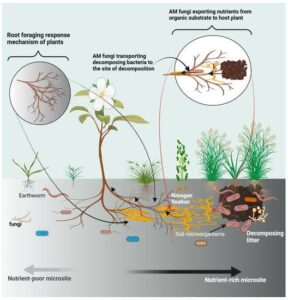Back to: MICROBIOLOGY 100 LEVEL
Welcome to class!
Hey champion! It’s so great to see your bright mind back in class. You’re doing wonderfully well, and today’s topic will make you love microbes even more. We’re talking about something super important—Roles of Microbes in Nature. These tiny living things are like invisible heroes, silently working behind the scenes to keep the Earth healthy and balanced. Let’s understand how!
Roles Of Microbes In Nature
Decomposition
One of the most vital jobs microbes do in nature is breaking down dead plants, animals, and waste materials. This process is called decomposition. Microbes like bacteria and fungi help recycle nutrients back into the soil. Without them, dead things would pile up, and the soil wouldn’t get the nutrients it needs for new plants to grow.

Example: When dry leaves fall from a mango tree or a goat dies in the bush, microbes break them down into simple nutrients that feed the soil. It’s like giving back to the earth what it gave us.
Nutrient Cycling
Microbes also play key roles in nutrient cycles like the nitrogen cycle and carbon cycle.
Nitrogen-fixing bacteria in the roots of legumes (beans, groundnuts, soybeans) change nitrogen from the air into forms plants can use to grow.
Nitrifying bacteria turn nitrogen compounds in the soil into nutrients for plants.
Denitrifying bacteria help balance nitrogen in the air by releasing it back.
Example: Imagine bacteria working as tiny farmers under the ground, helping crops grow strong and healthy.
Soil Fertility
By decomposing organic matter and enriching it with nutrients, microbes help improve soil fertility. This is why compost—rotted food waste and manure—is great for farming. It’s full of microbial life.
Waste Breakdown and Recycling
Microbes help clean the environment by breaking down human and animal waste, sewage, and even oil spills. In waste treatment plants, bacteria treat dirty water and make it clean enough to return to rivers.
Oxygen Production
Some microbes, especially algae and cyanobacteria, produce oxygen during photosynthesis. They contribute significantly to the oxygen we breathe—more than trees!
Food for Other Organisms
In ponds and oceans, microbes are the first step in the food chain. Tiny animals eat them, and bigger animals eat those tiny animals. Without microbes, the food chain would collapse.
Symbiosis
Some microbes live inside animals and humans and help with digestion. For instance, gut bacteria help us break down food and even produce vitamins like vitamin K.
Bioremediation
This big word simply means using microbes to clean up pollution—like oil spills or chemical leaks. Some bacteria can “eat” harmful substances and make the environment safe again.

Think of microbes like the street sweepers, farmers, builders, and doctors of nature. They clean up waste, build healthy soil, grow food, and even heal the environment.
Summary
- Microbes help decompose dead organisms and recycle nutrients.
- They fix nitrogen, produce oxygen, and enrich the soil.
- Microbes clean waste, support food chains, and live inside organisms to aid digestion.
- They play major roles in maintaining nature’s balance and health.
Evaluation
- Mention three ways microbes help in nature.
- What is decomposition, and which microbes are involved?
- Name one microbe that fixes nitrogen in soil.
- How do microbes help in waste recycling?
- Explain bioremediation in simple terms.
Isn’t it amazing how the tiniest living things play such big roles in our world? Keep this curiosity burning, and always remember—Afrilearn is proud to be part of your learning journey. Keep shining, brilliant mind!
